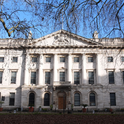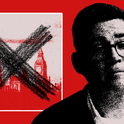Boris Johnson has consistently invited us to compare him with that historical titan, Winston Churchill. In October, newspaper photographers were called to the foreign secretary’s grace and favour country residence, Chevening, to capture him messing around on boats with a bemused group of foreign ministers from Eastern Europe. They were just nameless extras. It was really just about Boris.
Or rather it was about Churchill and Boris. Churchill was famous for conducting diplomacy at his own country retreat, Chartwell, a mere six miles away. Churchill spent years creating lakes at Chartwell and loved to show them off to his visitors. Now Johnson does the same. Geddit?
At party conference, Johnson had an answer to the glum mood. It did not involve offering ideas to solve the national crisis, but a tub-thumping rendition of old Churchill oratorical favourites. The party should be “bold” and “let the British lion roar,” he told his audience, exultant at this latest invocation of the great wartime leader. “Oh,” exclaimed one excited delegate, noticing the way he jutted his head over a well-padded middle, “Boris even stands like Churchill.”
Every campaign needs a manifesto and three years ago Johnson obliged with his book The Churchill Factor: How One Man Made History. By the end of the short introduction—in which Johnson refers to himself more than 30 times—it was clear whom the author believes is the “One Man” who can make history now. In politics these days, repeat a simple emotive message—however spurious—often enough and people start to believe it. (The infamous £350m for the NHS lie on a bus being one such example.)
In his book, Johnson argues that Churchill became a national saviour despite (or perhaps because of) being considered an adventurer, reckless, disloyal, in possession of “death-defying self-belief” and indeed not at all “what people thought of as a man of principle; he was a glory-cashing goal-mouth -hanging opportunist.” Yes, the picture soon becomes very clear what we should therefore think of Johnson himself.
Despite the absurdity of the comparison, some people on the right, including Paul Goodman, Editor of the respected Conservative Home website, seriously considered him fit to be our next prime minister. I’ve written books about both Churchill and Johnson, and, I can tell you, Boris Johnson: you’re no Winston Churchill.
It took Churchill 65 years to enter Downing Street and he arrived having held most of the important cabinet jobs and having used them to implement a frenetic series of reforms. He was buzzing with ideas, some of them good, other less so. One such was Churchill’s 1925 decision as Chancellor to tie sterling to the Gold Standard at unsustainably high levels, which was partly to blame for the economic slump of the late 1920s. (He thought it the greatest mistake of his career.) His handling of the Great Strike of 1926 was one of several occasions when he ended up looking cold-hearted and even trigger-happy.
By the time he reached Johnson’s age of 53, he had helped to found the welfare state, to introduce labour exchanges and workers’ pensions and to introduce the statutory tea break. He played a major part in setting up the Irish Free State and volunteered to serve on the Western Front. He had built up the Navy, voted in female suffrage, and survived at least one assassination attempt.
Churchill stood against the appeasers of the 1930s because he thought it his duty to warn his country of the Nazi threat. He was right—but his career was written off as a result. Nearly 80 years later Johnson backed “Leave” in the referendum not because he considered it a necessity to quit the EU (only a month earlier he had declared himself a Remainer) but because he calculated it would rescue his faltering political prospects.
True, Johnson was voted in twice as mayor of London, and has served more than a year as our diplomat-in-chief. His tenure at City Hall, however, was marked by chaos and a lack of ideas or action. Compare his gurning paralysis during the 2011 London riots to Churchill’s galvanising visits to Blitzed cities.
Johnson’s discomfort was palpable when he could no longer avoid meeting people whose lives had been devastated by the worst civil unrest for a generation. It was the same fearful look as when he was confronted with the possibility that he might have to deal personally with the mayhem created by the “Leave” vote. Both times, he fluffed it.
When Churchill was presented with the chance to lead in 1940 he seized it readily, and had a plan from the very first hour. America, he explained, would be dragged into the war on our side by hook or by crook. In contrast, Johnson’s 15 months as foreign secretary have been defined by headline-grabbing insults to foreigners: fellow Europeans can go “whistle” for their money, the then-French president Francois Hollande was acting like a Nazi prison guard. Most recently, he mangled the facts in the Nazanin Zaghari-Ratcliffe case, leaving the British woman possibly facing even more years in an Iranian jail.
In the end, despite Churchill’s heroic efforts to rally France into continuing the fight against Nazi Germany in 1940, Britain and its empire stood alone against its enemies. Thanks in no small part to Johnson’s unhinged self-promotion and the naivety of his followers, Britain now finds itself alone against its friends. The silly comparisons between these two figures really must stop.
Boris Johnson wants us to see him as a modern-day Churchill. Don't fall for it
The silly comparisons between these two figures really must stop
November 10, 2017

Boris Johnson before signing copies of his new book 'The Churchill Factor.' Photo: PA











